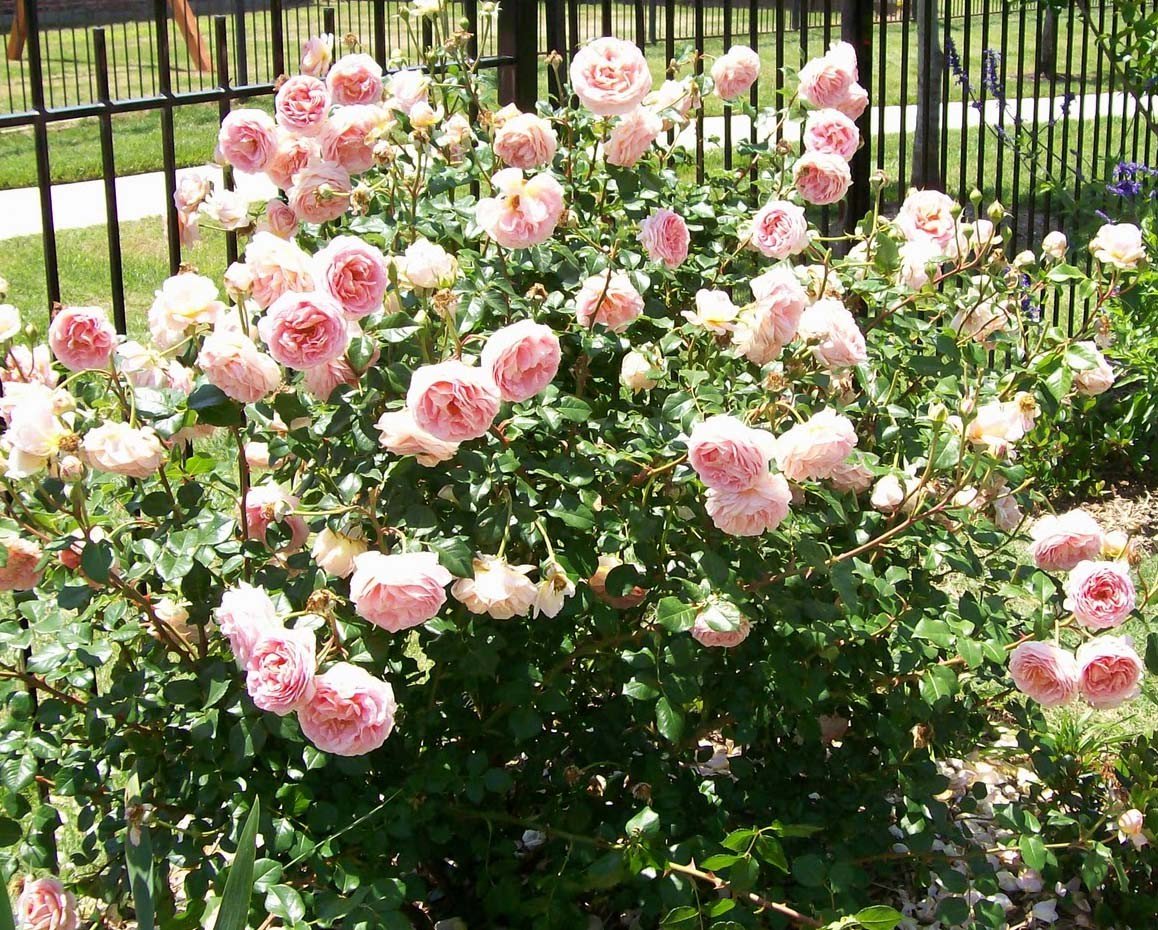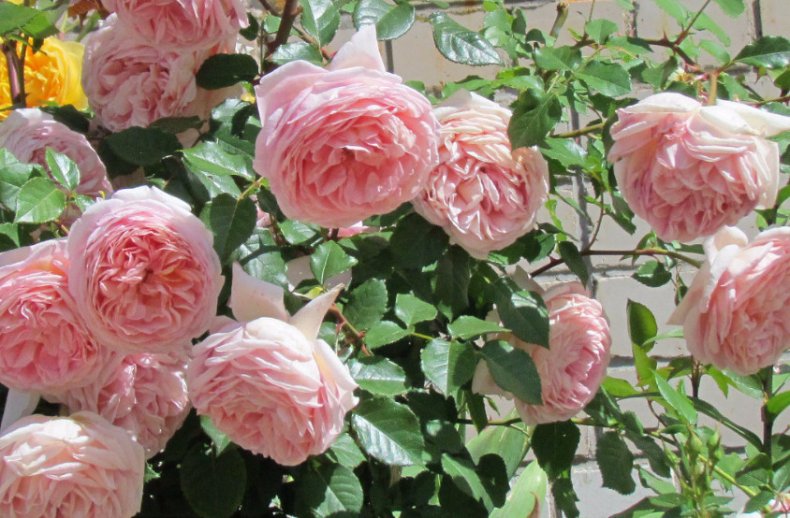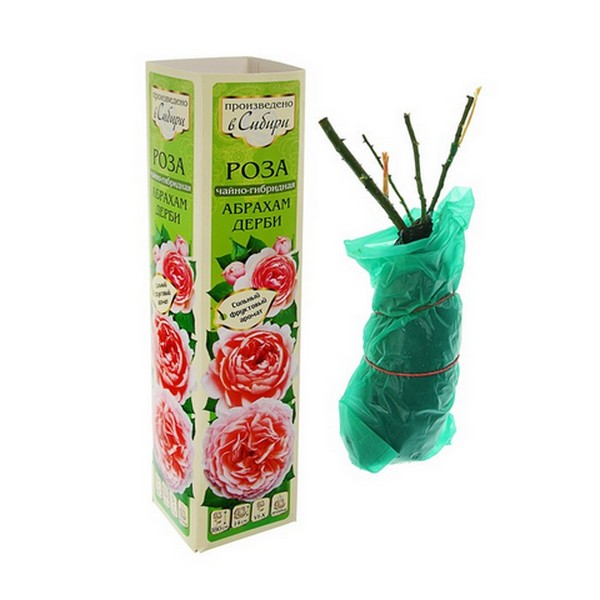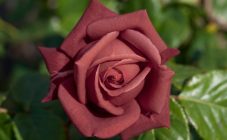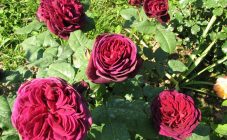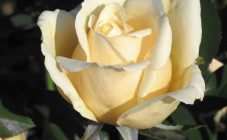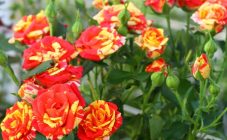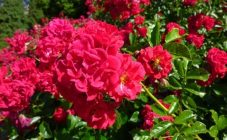Content:
Rarely in any garden area in the flower beds you will not find the "queen of flowers" - a rose. Currently, there are many species and varieties of these beautiful plants with a delicate pleasant aroma, bred by breeders from many countries of the world.
Among the many such breeders, the Englishman David Austin is famous, who created more than 190 different varieties of the "queen of flowers", which have not yet been singled out as a separate official variety. However, among flower growers and specialists, such varieties are always referred to as Austin roses. One of the brightest representatives of the flowers of this group is the Abraham Derby rose - original and graceful, with large flowers of a pale pink color. The main characteristics of the variety and the nuances of cultivation, the advantages and disadvantages of this variety - you can read about all this below.
General information about Austin roses, history of the creation of the rose by Abraham Derby
All varieties of roses bred by British breeder David Austin are perennial shrubs and stand out among other similar flowers. The bushes of these plants are tall with erect shoots about 1.5 m long and more, the buds have a classic goblet shape and a delicate original aroma inherent in all varieties bred by this breeder.
David Austin decided to "revive" the old varieties of bush "queens of flowers", his goal was to develop on their basis such plants that would be distinguished by increased resistance to diseases, bloomed several times per season, would have beautiful forms, could grow in regions with different climatic conditions, and the flowers would be beautiful and have a pleasant aroma. In addition, this breeder sought to breed such roses, the color of the petals of the buds of which would be yellow or orange.
Almost all the varieties bred by Austin are still popular with flower growers and gardeners in most countries of the world, despite the fact that more than half a century has passed since the appearance of these varieties.
The Abraham Derby variety was bred in 1965, its “parents” were the Yellow Cushion polyanthus rose, whose flower petals have an intense yellow color, and the climbing double rose Aloha, whose buds are pink with a red tint.
The flowers of the English rose Abraham Derby are densely doubled, have a classic bowl-like shape, which is characteristic of all bush "flower queens". The color of the petals of the bud in the central part is pale pink, and the outer petals are yellow. The originality and unusualness of these flowers is that they can change color depending on climatic conditions. These flowers, like chameleons, can be pink with a slight shade of yellow at first, and then change color to a delicate peach.
Description and features of the variety
The Abraham Darby rose is a tall perennial shrub, lush and rounded, the length of erect shoots reaches 1.5 m.If the Abraham rose is well looked after and the climatic conditions are favorable, then the stems can reach a height of more than 2.4 m.
Derby rose, bred by the British breeder Austin, grows very actively, so in the park area it is often used as climbing.Up to three buds can form simultaneously on one shoot.
The buds of this rose are double, fully blossoming buds in a radius can be up to 7 cm. These perennial bushes bloom from the first decade of June to the last decade of September, and new buds appear continuously. In order for the flowering to be active and abundant, it is recommended to constantly remove the wilting flowers. The aroma of this rose is intense fruity with a predominance of lemon scent.
But this variety has an average resistance to various diseases characteristic of rose bushes, as well as to the attack of "harmful" bugs. Also, the Abraham rose reacts very badly to the rainy season - in such weather, new flowers do not appear, and the buds do not bloom.
Agrotechnics
Seedlings of this variety should be purchased only in special nurseries, choosing bushes that are at least 2 years old. Such plants can already withstand severe frosts, quickly adapt to a new place and grow actively.
When choosing planting material, you need to pay attention to the condition of the root system and shoots. The roots should be firm, not dry. Healthy roots are not damaged, do not break, but only bend. Some of the shoots should be lignified and the rest should be green.
The purchased seedlings can be planted both in the spring and in the fall. Plants planted in spring will have time to take root well in the open field, they will have time to grow before autumn and will better endure the winter cold. But experts recommend planting roses in the fall. This should be done in time so that the bushes have time to take root before the onset of frost.
Before planting, the shoots are cut, leaving no more than 6 buds on each. The roots are trimmed, removing dry or damaged ends along the way.
A landing hole is dug for one and a half bayonets of a shovel. At its bottom, a layer of drainage material 5-8 cm thick is laid out, then a layer of a nutrient substrate consisting of equal parts of peat, river sand and humus or compost. The plant is placed in the hole, spreading the roots along the entire diameter of the hole. Then completely fill the pit with soil, slightly compacting it.
Further care for the planted bushes consists in regular watering, loosening the soil, removing weeds, and periodically applying top dressing.
These flowers are watered every 7 days, adding at least a bucket of settled water under each bush. Watering is completely stopped in the first decade of September.
In the first season after planting, fertilizing is not required, and then these bushes are fed regularly throughout the season at least once every 12-14 days.
.
Advantages and disadvantages of the variety
Those who decide to plant Abraham Derby seedlings in their garden should learn more about all the pros and cons of the variety. The main advantages of this "queen of flowers":
- high decorativeness of flowering bushes, original and unusual appearance of blossoming buds;
- original and unusual bicolor color of flowers;
- flowering period - over several summer months;
- active use in landscape design in single plantings and in groups with other flowering annuals and perennials;
- persistent pleasant citrus aroma.
But this perennial shrub also has some disadvantages:
- resistance to most diseases and insect attacks - medium;
- cold resistance - medium;
- this shrub equally does not tolerate extreme heat and the rainy season, it can stop flowering under such conditions.
Despite the few shortcomings and troubles in planting and further caring for the seedlings of the Abraham rose, this variety will be one of the main decorations of any garden plot due to the high decorative effect of flowering bushes.
